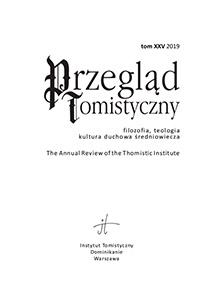WOJCIECH WCIÓRKA, Stephen Langton on Common Supposition

Volume XXV: 2019
Philosophy — Theology — Spiritual culture of the Middle Ages
ISSN 0860-0015
e-ISSN 2544-1000
SUMMARY
This paper argues that the notion of the “common” supposition employed by Stephen Langton (fl. ca 1200, † 1228) does not involve ambiguity (duplicitas, multiplicitas) but should be explained in terms of generalized or disjunctive truth conditions. This means that a sentence such as “deus generat” (“God begets”) is true even if just one of the referents of the subject term has the property attributed by the predicate. The common supposition of “deus” in this context encompasses both the divine being (essentia) and a person, whereas the distinctive property attached by “generat” inheres only in the Father. And yet we are in no position to claim that on Langton’s model “deus generat” is true with regard to a divine person but false with regard to the divine being. The sentence “deus generat” is simply true, just because one of the elements of the common supposition happens to satisfy the predicate and make the sentence true. Some aspects of Langton’s views were developed by his student Geoffrey of Poitiers, whose unedited Summa ‘Ego novissimus’ sheds light on several tricky points, including the analogy between “deus generat” and the semantic statement “homo supponitur,” which is said to involve both simple and personal supposition.
